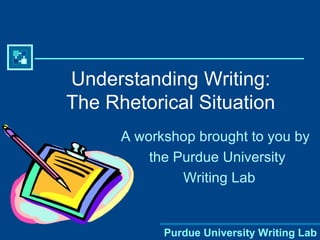Retorical Situation
- 1. Understanding Writing: The Rhetorical Situation A workshop brought to you by the Purdue University Writing Lab
- 2. Rhetorical Situation Writer Purpose Audience Topic Context
- 3. Writer your personal characteristics and interests affect what you write about and how you write about it
- 4. Writer: factors which can affect your writing include your age your experiences your gender your location your political beliefs your education your parents and peers your religion
- 5. Purpose: your reason for writing to ___________ to inform to persuade to educate to call to action to entertain to shock
- 6. Genre category of writing examples: fiction, autobiographical story, news article, review, editorial, analysis genres hinge upon purpose and the needs of the projected audience
- 7. Audience: to whom are you writing? many of the same factors which affect the writer also affect the audience age social class education
- 8. Topic whatever it is that you have selected to write about may be broadened or narrowed, depending upon the length of the article and your level of interest
- 9. Context the ŌĆ£situationŌĆØ which generates the need for writing affected by time period location current events cultural significance
- 10. Rhetorical Situation Writer Purpose Audience Topic Context
- 11. What This Means You need to be aware that a rhetorical situation exists EVERY TIME you write. You need to adapt your writing depending upon your purpose and your audience.
- 12. Where can you go for additional help with writing assignments? Purdue University Writing Lab Heavilon 226 Grammar Hotline: (765) 494-3723 Check our web site: http://owl.english.purdue.edu Email brief questions: [email_address] Purdue University Writing Lab
Editor's Notes
- #2: Rationale: Welcome to ŌĆ£Understanding Writing: The Rhetorical Situation.ŌĆØ This presentation is designed to introduce your students to a variety of factors that contribute to strong, well-organized writing--the rhetorical situation. The twelve slides presented here are designed to aid the facilitator in an interactive presentation of the elements of the rhetorical situation. This presentation is ideal for the beginning of a composition course or the assignment of a writing project. This presentation may be supplemented with an OWL handout, ŌĆ£Higher Order Concerns and Later Order Concerns (HOCs and LOCs)ŌĆØ (http://owl.english.purdue.edu/handouts/general/gl_hocloc.html). Directions: Each slide is activated by a single mouse click, unless otherwise noted in bold at the bottom of each notes page Writer and Designer: Jennifer Liethen Kunka Contributors: Muriel Harris, Karen Bishop, Bryan Kopp, Matthew Mooney, David Neyhart, and Andrew Kunka Developed with resources courtesy of the Purdue University Writing Lab Grant funding courtesy of the Multimedia Instructional Development Center at Purdue University ┬® Copyright Purdue University, 2000.











![Where can you go for additional help with writing assignments? Purdue University Writing Lab Heavilon 226 Grammar Hotline: (765) 494-3723 Check our web site: http://owl.english.purdue.edu Email brief questions: [email_address] Purdue University Writing Lab](https://image.slidesharecdn.com/retoricalsituation-090610003709-phpapp01/85/Retorical-Situation-12-320.jpg)